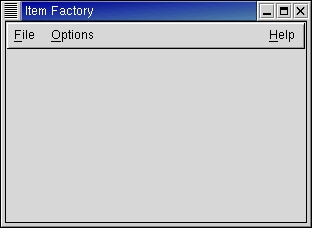The itemfactory.py example program uses the gtk.ItemFactory. Figure 11.2, “Item Factory Example” illustrates the program display:
The source code for itemfactory.py is:
1 #!/usr/bin/env python
2
3 # example itemfactory.py
4
5 import pygtk
6 pygtk.require('2.0')
7 import gtk
8
9 class ItemFactoryExample:
10 # Obligatory basic callback
11 def print_hello(self, w, data):
12 print "Hello, World!"
13
14 # This is the ItemFactoryEntry structure used to generate new menus.
15 # Item 1: The menu path. The letter after the underscore indicates an
16 # accelerator key once the menu is open.
17 # Item 2: The accelerator key for the entry
18 # Item 3: The callback.
19 # Item 4: The callback action. This changes the parameters with
20 # which the callback is called. The default is 0.
21 # Item 5: The item type, used to define what kind of an item it is.
22 # Here are the possible values:
23
24 # NULL -> "<Item>"
25 # "" -> "<Item>"
26 # "<Title>" -> create a title item
27 # "<Item>" -> create a simple item
28 # "<CheckItem>" -> create a check item
29 # "<ToggleItem>" -> create a toggle item
30 # "<RadioItem>" -> create a radio item
31 # <path> -> path of a radio item to link against
32 # "<Separator>" -> create a separator
33 # "<Branch>" -> create an item to hold sub items (optional)
34 # "<LastBranch>" -> create a right justified branch
35
36 def get_main_menu(self, window):
37 accel_group = gtk.AccelGroup()
38
39 # This function initializes the item factory.
40 # Param 1: The type of menu - can be MenuBar, Menu,
41 # or OptionMenu.
42 # Param 2: The path of the menu.
43 # Param 3: A reference to an AccelGroup. The item factory sets up
44 # the accelerator table while generating menus.
45 item_factory = gtk.ItemFactory(gtk.MenuBar, "<main>", accel_group)
46
47 # This method generates the menu items. Pass to the item factory
48 # the list of menu items
49 item_factory.create_items(self.menu_items)
50
51 # Attach the new accelerator group to the window.
52 window.add_accel_group(accel_group)
53
54 # need to keep a reference to item_factory to prevent its destruction
55 self.item_factory = item_factory
56 # Finally, return the actual menu bar created by the item factory.
57 return item_factory.get_widget("<main>")
58
59 def __init__(self):
60 self.menu_items = (
61 ( "/_File", None, None, 0, "<Branch>" ),
62 ( "/File/_New", "<control>N", self.print_hello, 0, None ),
63 ( "/File/_Open", "<control>O", self.print_hello, 0, None ),
64 ( "/File/_Save", "<control>S", self.print_hello, 0, None ),
65 ( "/File/Save _As", None, None, 0, None ),
66 ( "/File/sep1", None, None, 0, "<Separator>" ),
67 ( "/File/Quit", "<control>Q", gtk.main_quit, 0, None ),
68 ( "/_Options", None, None, 0, "<Branch>" ),
69 ( "/Options/Test", None, None, 0, None ),
70 ( "/_Help", None, None, 0, "<LastBranch>" ),
71 ( "/_Help/About", None, None, 0, None ),
72 )
73 window = gtk.Window(gtk.WINDOW_TOPLEVEL)
74 window.connect("destroy", lambda w: gtk.main_quit(), "WM destroy")
75 window.set_title("Item Factory")
76 window.set_size_request(300, 200)
77
78 main_vbox = gtk.VBox(False, 1)
79 main_vbox.set_border_width(1)
80 window.add(main_vbox)
81 main_vbox.show()
82
83 menubar = self.get_main_menu(window)
84
85 main_vbox.pack_start(menubar, False, True, 0)
86 menubar.show()
87 window.show()
88
89 def main():
90 gtk.main()
91 return 0
92
93 if __name__ == "__main__":
94 ItemFactoryExample()
95 main()
|
For now, there's only this example. An explanation and lots 'o' comments will follow later.
